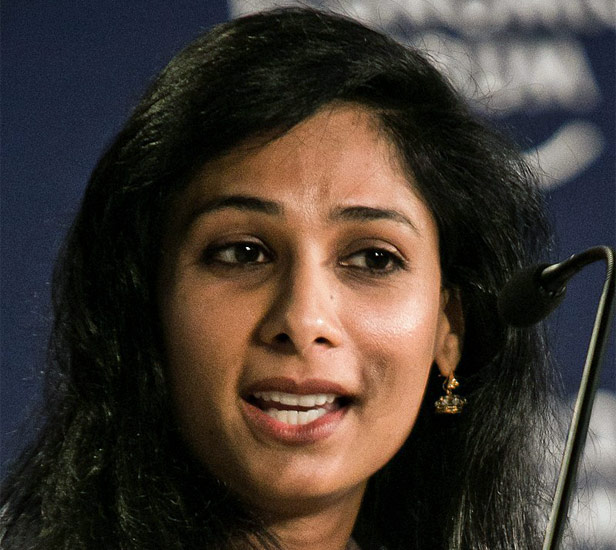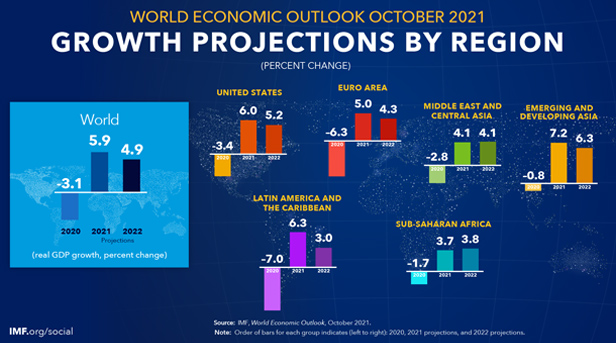News October 12, 2021
IMF Trims Economic Forecast, Raises Inflation Concerns
The downgrade in anticipated growth in the U.S. and global economies is a partial result of supply chain disruption and delta variant spread.
Warning of the growing threat from inflation, the International Monetary Fund (IMF) says that supply chain disruption and fallout from the global spread of COVID-19’s delta variant has led the organization to lower its forecast for economic growth in the United States and the global economy as a whole.

Gita Gopinath, chief economist, IMF
IMF, a Washington, D.C.-based group consisting of 190 member countries that work together to foster global monetary cooperation and secure financial stability, says that the U.S. economy will grow 6% year over year in 2021.
That’s down from the 7% forecast in July, but still a far cry better than the 3.4% decline experienced in 2020 amid the onset of COVID-19. While trailing China’s projected 8% growth in 2021, the anticipated U.S. performance is still expected to outpace the rate of expansion in much of the developed world.

The rate of economic growth in the U.S. is likely to outpace the eurozone, but expected to be slower than in some areas of the world that are still developing.
Meanwhile, the IMF says the global economy will expand 5.9% in 2021, 0.1 percentage point lower than it had predicted in the July forecast.
“The downward revision for 2021 reflects a downgrade for advanced economies — in part due to supply disruptions — and for low-income developing countries, largely due to worsening pandemic dynamics,” IMF detailed in its report. “This is partially offset by stronger near-term prospects among some commodity-exporting emerging market and developing economies.”
🆕 The IMF projects the global economy to grow at 5.9% in 2021 and 4.9% in 2022, 0.1 percentage points lower for 2021 than the July forecast. More in the just-released October 2021 World Economic Outlook. https://t.co/j0FIiCr9li #WEO pic.twitter.com/jQjXB6f8Xm
— IMF (@IMFNews) October 12, 2021
Notably, the IMF raised concerns about inflation, including in the United States and other advanced economies like the United Kingdom. While headline inflation is expected to peak in the final months of 2021 and return to pre-pandemic levels by mid-2022 for most economies, the IMF warned that the prospects for how things will actually play out remain “highly uncertain … given the recovery’s unchartered nature … and inflation could exceed forecasts for a variety of reasons.”
Said IMF Chief Economist Gita Gopinath: “While monetary policy can generally look through transitory increases in inflation, central banks should be prepared to act quickly if the risks of rising inflation expectations become more material in this uncharted recovery. Central banks should chart contingent actions, announce clear triggers, and act in line with that communication.”
Much of the uncertainty exists, of course, because of COVID-19 and the possibility for more variants to emerge and derail economic progress. Gopinath emphasized that vaccinations must reach more people around the world to help create economic stability.
“The foremost priority is to vaccinate the world,” Gopinath said. “Much greater multilateral action is needed to vaccinate at least 40% of the population in every country by the end of this year and 70% by the middle of next year.”
Chief Economist @GitaGopinath summarizes the main findings of the World Economic Outlook, the risks facing the world, and our policy recommendations. https://t.co/KnxQBjiK2u #WEO pic.twitter.com/Nb5Gwe7IGI
— IMF (@IMFNews) October 12, 2021
